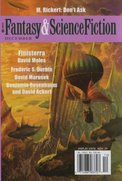
| Editor: | Gordon van Gelder |
| Issue: | Volume 113, No. 6 |
| ISSN: | 1095-8258 |
| Pages: | 162 |
The non-fiction this month was particularly good, with a great book column by Michelle West and an enjoyable panning of the second Fantastic Four movie by Lucius Shepard. The fiction was an okay mix of different settings and styles, with nothing that stood out that much but only one failure for me.
"Osama Phone Home" by David Marusek: The thriller story (of a sort) in this issue, this is a tongue-in-cheek look at a secret organization in the US dedicated to going after Osama bin Laden. Mixed in with the details of cell organization and enforcement of organizational orthodoxy is a bizarre scheme of cell phone wiretapping and voice recognition mixed with ways to force people to call others on the phone. It's all very light, not diving much into characterization and mostly describing ideas and background in broad terms. The story gets a bit of a barb from the ending, but nothing with much sting. Vaguely amusing. (6)
"Stray" by Benjamin Rosenbaum & David Ackert: This is the best story of the issue, a lovely exploration of a fae man passing as human and the challenge of suppressing his natural reactions to human desires. I loved the portrayal of humans from a fae perspective, the constant temptation, and the aspects of racial discrimination that the story picks out and explores. It's a hard story, in that there aren't easy answers and tends towards the tragic, but the viewpoint character is satisfying to root for. I'd like to see more of this. (7)
"The Bone Man" by Frederic S. Durbin: This long novelette is the horror entry of the issue, following a hit man's discovery of a sleepy small town and their odd Halloween tradition. The sociopathic viewpoint character is surprisingly compelling and I liked the slow build and setup as he wanders the town and becomes increasingly curious about the local skeleton who shows up every Halloween. Unfortunately, towards the end of the story the outcome becomes obvious and mostly uninteresting, and the conclusion is pointlessly disgusting and doesn't add much to the story. A good start but without an ending to back it up. (6)
"Don't Ask" by M. Rickert: I never understood this story. It's about a town that loses its children to wolves but finds them again later, and about that adjustment process, but it's told in a sort of dream-like, emotional tone with a first-person plural perspective and all the specific details of what happened and what's going on are coded and talked about indirectly. Sometimes this clicks for me, but here I just ended up confused and uncomprehending. I'm guessing there's allegory here that escaped me. (3)
"Who Brought Tulips to the Moon?" by S.L. Gilbow: This story, however, is refreshingly straightforward, if creepy. It's set in a future where long live has become a problem, where one is charged more and more as one gets older and continues to consume resources. Because of that, there are places one can go on the moon for a quiet, painless death if one's body isn't accomodating enough to kill you at a reasonable age. This is presented with a very passive viewpoint character who never truly rebels against this system and these expectations, whose primary attitude seems to be a vast tiredness. The result is far more understated than such a sharp premise would imply. I think it mostly worked, but the overall effect is odd. (6)
"Finisterra" by David Moles: More than anything else, this story reminds me of the gas giant sections of Iain M. Banks's Look to Windward. It's set in a similar world where the depths of the atmosphere are hot and crushing and where life exists in a band populated by enormous flying animals, ones big enough to carry islands and whole ecosystems on their backs. The scenery is the primary point; the plot tries for twists of loyalty and political alliance but feels populated by stock characters and turns into a typical settlers vs. corporations vs. government scenario. The non-traditional cultural backgrounds of the characters (Arabic, Muslim, and Spanish) adds a bit of interest, though. I wish the story were stronger, since the scenery had a lot of potential. (6)
Reviewed: 2008-02-12